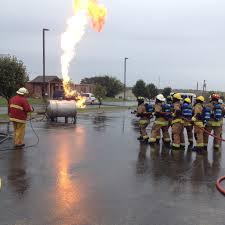 Over fifty Volunteer Firefighters representing nine Fire Departments attended the Propane Emergency Class at the Cairo Community Center on Tuesday, February 24, 2015. The Departments included Alda, Ashton, Boelus, Dannebrog, Elba, Loup City, Rockville, St. Paul, Loup City, and Cairo.
Over fifty Volunteer Firefighters representing nine Fire Departments attended the Propane Emergency Class at the Cairo Community Center on Tuesday, February 24, 2015. The Departments included Alda, Ashton, Boelus, Dannebrog, Elba, Loup City, Rockville, St. Paul, Loup City, and Cairo.
Brian Busse, instructor for the NE State Fire Marshall Training Division, presented a four-hour class for the Firefighters regarding the safe and effective methods to combat a propane emergency. The class was presented in cooperation with the National Propane Gas Association.
In order to actively combat the actual fire or “hot spot emergency,” attendance was required. The actual ‘hands-on’ fire emergency event will take place at the Cairo Community Center parking lot on Tuesday, March 3, 2015.
The class began with the general discussion of safety issues for everyone involved (Firefighters, Law Enforcement, HAZMAT people, EMT’s spectators, etc). The focus then centered on the following eight-step process:
- Site Management and Control (How to secure and control the hot, warm, and cold zones)
- Identifying the Problem (Recognizing the gases, types of containers, terrain, winds, etc)
- Evaluating the Hazards and Risks (Types of gas behavior, weather conditions, available resources and water capacity for cooling containers, safety considerations)
- Selecting Protective Clothing and Equipment
- Managing Information and Coordinating Resources (Organizations include the Fire Department, law enforcement, industry response teams, and others such as the highway department, vehicle recovery services, and salvage companies.)
- Implementing Response Objectives (Understanding and choosing an offensive strategy, defensive strategy, or non-intervention strategy)
- Decontamination, if necessary (Detox, formal cleaning procedures)
- Terminating the Incident (Accounting for all personnel’s health and safety, tools and machinery, and the neutrality of the site itself. De-briefing. Documentation of the event.)
Time was also given to combustion ratios, carbon monoxide hazards, and toxic conditions that cause nausea, headaches, dizziness, and other noticeable physical changes. Procedures were discussed for handling such emergencies.
“The turn-out was really great tonight. There was a lot to learn and, whether we’re operating as individual departments, or together as mutual aid, this class really helped us all. I look forward to our ‘burn’ next week when we will apply what we’ve learned.” Chief Steve Oseka, Cairo Rural Volunteer Fire Department.
P.S. Please mark your calendars for the Annual Smorgasbord, March 14th. Cairo

